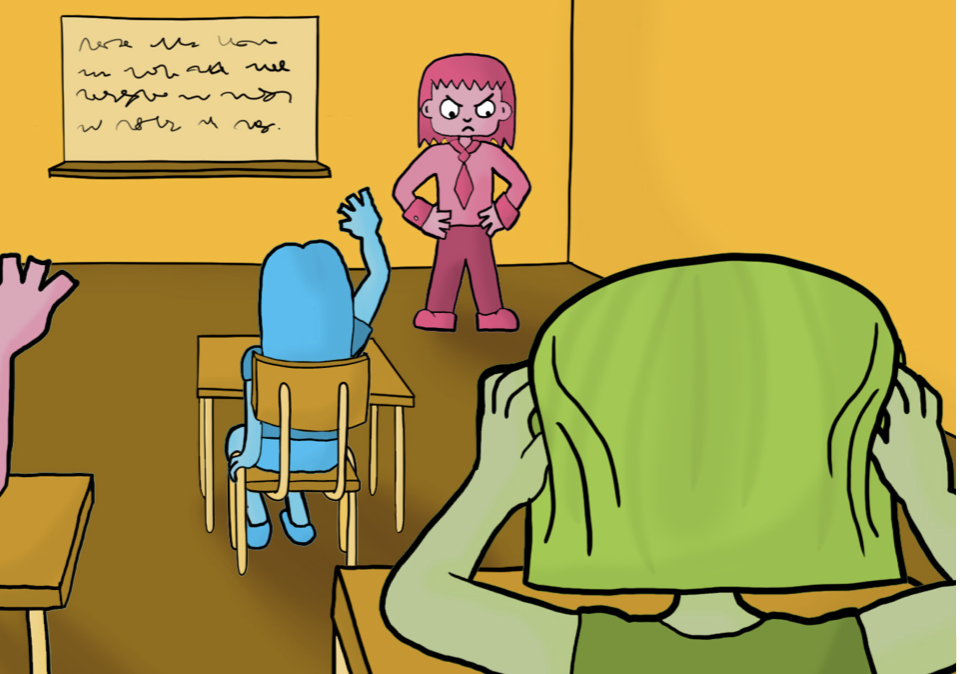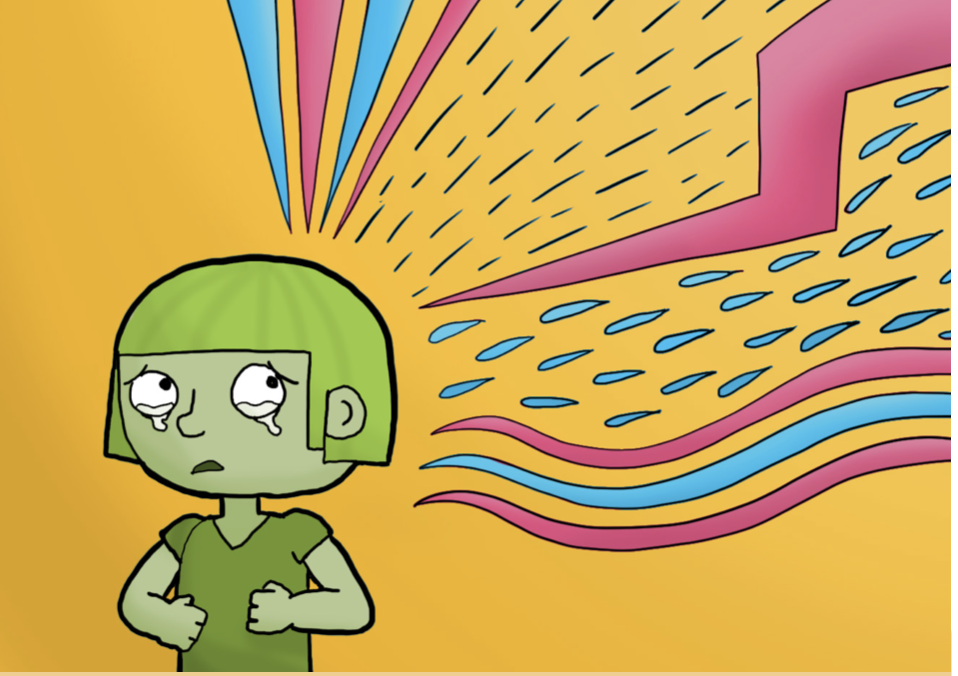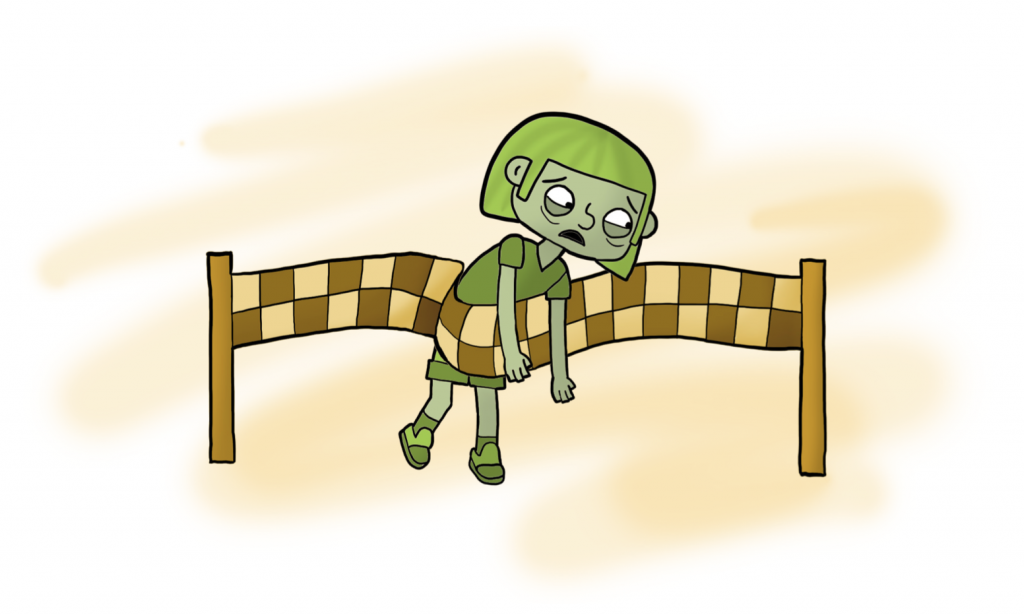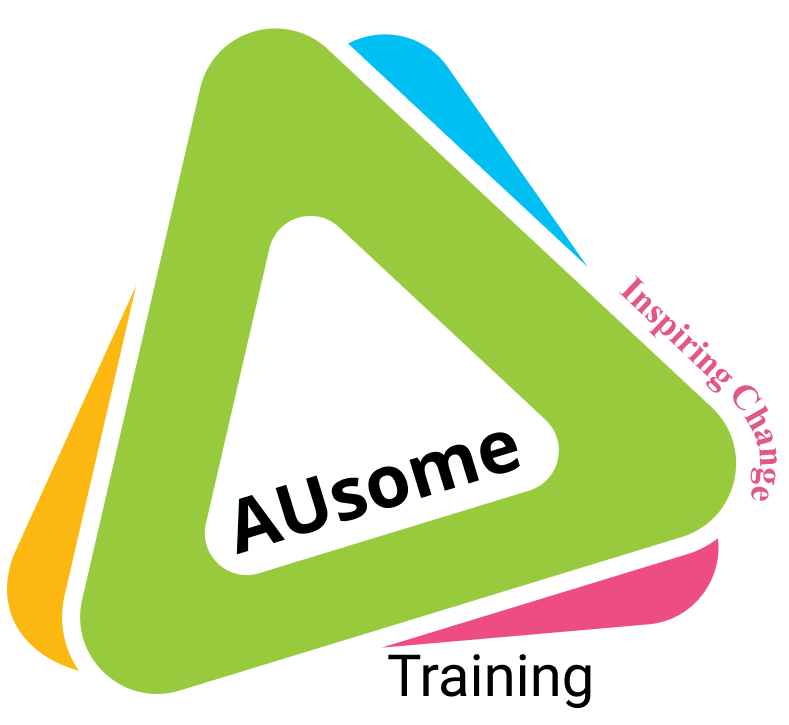Why Charlie doesn’t go to school
If people in Charlie’s life don’t understand that Charlie has perfectly good social skills and communicates Autistically then this can create unnecessary difficulties in Charlie’s little life.
So let’s have a look at Charlie’s life.
Charlie goes off to school and people there have not been educated about Autistic communication. Charlie needs to look away from people in order to listen to them well. So Charlie looks away so that they can visualise what the other person is saying to them. But Charlie’s teacher doesn’t know this and presumes that Charlie is not listening when in fact they are listening really attentively. Charlie regularly get into trouble for “not listening” when they are in fact listening really well. This is upsetting for Charlie and they start to feel like they are a bad person and that they are letting people down. Charlie also notices that they are the only one in the class who is told they are not listening, even though they are.

So in order to stay out of trouble Charlie does what they see other kids doing. They concentrate really hard and force themself to look at the teacher when teacher speaks. They nod and smile and look at teacher’s face. Now teacher does not give out to Charlie for not listening. Charlie stays out of trouble even though now Charlie is hardly ever able to actually listen because they are so pre-occupied with pretending to listen and staying out of trouble.
Charlie moves up a class and starts with a new teacher. This teacher was taught that Autistic kids don’t have social skills and that they need to be taught how to interact. This teacher wants to help Charlie to interact and make friends so they focus all their attention on getting Charlie to make eye contact. They reward Charlie when they make eye contact and ignore Charlie’s attempts to communicate when they fail to meet the eye- contact goal. This is an example of positive behaviour support. The teacher has been taught to reinforce positive behaviour. But no-one has taught the teacher that this is actually negative behaviour on the part of the adult. Eye contact is painful for Charlie, it makes Charlie feel icky inside and when Charlie feels like this then Charlie can’t really concentrate or learn. So now Charlie spends their days feeling worn out and uncomfortable from pretending to listen, or at least act like they are listening in a way that teacher will accept. And now Charlie has the pain and discomfort of forced eye contact on top of this.

As well as this the teacher has started to talk to Charlie in a way that they don’t use for the other kids. Teacher keeps asking Charlie if they need help when they don’t and when giving instructions says things like “first, then” in patronising tones. This makes Charlie feel uncomfortable and it makes the other kids think that Charlie is different to them. They see how adults treat Charlie differently and so they also start to treat Charlie differently. Charlie’s days are getting tougher and tougher.

Charlie, like every other child, moves throughout the day. Charlie rocks back and forth as teacher talks, well they rock at least at times when teacher isn’t demanding eye contact and non-autistic listening cues from then. Charlie rocks as teacher talks and filters out the information that they already know and stores the new bits. Charlie’s rocking also helps Charlie to connect this new knowledge to other knowledge Charlie has. Sometimes Charlie makes connections and wonderful discoveries and learns something in a very deep way, on many different levels.
Charlie’s teacher thinks that Charlie’s rocking is very distracting for other kids. Teacher tells Charlie to do their stimming outside on a movement break. This makes no sense to Charlie because Charlie isn’t filtering and processing and learning when they’re not in the classroom so it’s utterly pointless to rock when on a movement break. But Charlie doesn’t want to distract the other kids. Charlie doesn’t want to get in more trouble so Charlie tries their very best not to rock in class.
So now Charlie is in a school where they have been taught not to listen, not to learn and not to do any of the things which are just very natural things to Charlie.
Charlie also gets excited when they think of something during class. Charlie’s mind is really good at making connections and Charlie gets really excited when they make a new connection or really get something. It feels so great! It’s also important to Charlie that they get to stim right away- this means to share an internal experience externally- so in this case Charlie says their thoughts aloud. If Charlie does’t get to share their thoughts straight away they may disappear forever so Charlie shares before they forget.
Charlie gets in trouble for not waiting their turn and teacher was taught that Autistic kids don’t know how to take turns. Teacher gets another reward chart for Charlie to teach them how to wait their turn. Every time Charlie shares their inner thoughts without raising their hand or being asked Charlie doesn’t get a star on their chart. If Charlie tries really hard to hold their thoughts inside they get a star. After some weeks of more “positive behaviour support” Charlie trains themself to hold it all inside. Their head often feels like it’s going to explode but they know teacher will not be pleased if they blurt something out so they hold the explosion inside all day. Teacher tells the other teachers and Charlie’s parents that they are doing much better at school. Teacher praises Charlie for their efforts. Charlie’s parents are proud that they are doing so well in school. Everyone talks about how effective the reward charts have been while all the time Charlie dies a little inside.
The learning that Charlie’s adults do not see is that Charlie is learning that everything they do is wrong. Charlie learns that in order to be treated well they must please everyone else in their lives. Charlie spends most days in school just about holding it together. Some days this is really tough so when Charlie gets home they let it all out. Home is safer than school and Charlie’s parents know what to do. Charlie’s parents talk to the school but the school see no problem at all. Charlie is getting on very well at school. The school have suspicions that Charlie is being spoilt at home and acting out for their parents’ attention.
Another stim that Charlie does is when they doodle all over their books. Teacher doesn’t understand that doodling is just like rocking for Charlie and tells Charlie to stop doodling and to pay attention. Charlie is once more left feeling confused. This is how Charlie concentrates and learns. But Charlie knows the drill at this point so now Charlie hides their hands under the desk and manages to do a stifled action that helps them to listen and learn, as much as they can at this stage with all the other things they cannot do.
No one has taught Charlie’s teachers about Autistic Communication and so Charlie regularly gets in trouble for communicating in their natural way. Some instructions are given by teacher which don’t take Charlie’s communication into account. Teachers say things like “open your books on page 34”. Charlie does as they are told and opens their book on page 34. Teacher get annoyed with them and tells Charlie that they are being cheeky. Charlie is so sad inside, they wish they didn’t have to go to school. Some days they wish they didn’t have to exist at all.
Charlie, just like so many other Autistic kids communicates literally so when teacher says to open their books at page 34 that is exactly what Charlie does. Other children who are not Autistic communicators hear the inference in the teacher’s instruction and so they open their books on page 34 and begin to do the work on page 34. Charlie doesn’t. Charlie follows the instruction to the letter. Charlie’s teacher sees them sitting there, not writing anything and thinks that Charlie is deliberately not doing what they were asked to do. Charlie gets in trouble. And then their teacher asks them “when are you going to be like everyone else Charlie?’. This question really confuses Charlie on many many levels. First Charlie cannot answer because they cannot give a date or time when they will be like everyone else, this is an impossible question to answer. And then there is the deep knowing that teacher sees Charlie as a problem and not like other children. Charlie knows that school would be a better place for everyone if they were not there to mess it up for everyone.
Charlie doesn’t feel like going to school these days. Charlie doesn’t actually much like to leave their room because their bedroom is safe and they can feel comfortable in there. Outside the world is scary and people don’t like Charlie there. Outside means always getting into trouble but never fulling understanding why.




